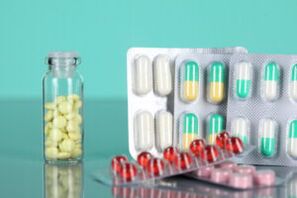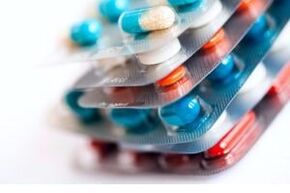Usually, in the process of diagnosing male prostatitis, doctors usually treat prostatitis with drugs at the beginning. In fact, this therapy is very laborious and time-consuming. The prescription of drugs is only carried out by experts based on symptoms and diagnostic indicators.
How to understand prostate inflammation?
Prostatitis develops rapidly. When uncomfortable symptoms appear, you can understand the disease:

- Decreased libido;
- Rapid ejaculation;
- A feeling of constant fullness in the bladder;
- Discomfort during defecation, pain in the perineum;
- Onset of uncontrolled slow erection;
- Thin intermittent flow of urine;
- Persistent fatigue for no reason;
- With the addition of bacteria, the temperature rose to 41 degrees.
It is important to determine the form and predisposing factors of the disease before starting treatment. For example, when harmful bacteria cause stagnation and damage, antibiotics are mainly used for treatment to suppress harmful bacteria. The main treatment for prostatitis is to choose the most effective drugs.
Drug, release form
The drug treatment of prostatitis involves many drugs with different release forms. But it is important to understand that one or the other form should be prescribed taking into account the stage, form, type of development, existing symptoms and use contraindications of the disease.
Use in all known drug groups:
- Set up solutions for microcells to inhibit the inflammatory process;
- Tablets, especially antibiotics, as a form of medicine for the treatment of prostatitis;
- Rectal suppositories have a direct effect on the affected lesions;
- Injection, as a quick-acting drug to inhibit the inflammatory process in prostatitis.
Many men complain about the need for rehabilitation from mental and neurological diseases. Prostatitis is a kind of strong sex, it is a blow from the waist down, and erection worsens sharply, and its effectiveness is greatly reduced. Men are beginning to be in a state of stress, and the problem arises in the personal realm.
Sedatives or antihistamines will be rescued to relieve edema and inflammation, although the dosage and course of treatment should not be ignored to avoid side effects and sharp deterioration of the situation. In addition, many people are interested in how to treat male prostatitis with drugs, and which one is better: pills or suppositories? The introduction of suppositories involves the close location of the prostate. However, suppositories are safer, do not affect the stomach, dissolve quickly in the rectum, and redirect to the injured area through the bloodstream. It will take effect after 20 minutes.
If you no longer have the power to endure pain, even though money will enter the stomach and split in the liver when many useful substances have lost its effect, you can use pills to eliminate the problem. The tablet will work after 40-45 minutes. Therefore, it is best to choose rectal suppositories to treat and prevent prostatitis and prostate adenoma.
Prescribed drugs
It is important to guide drug therapy to suppress the source of inflammatory lesions.
Taking into account the characteristics of the inflammatory process, the type of disease, the degree and stage of the development of prostatitis, these drugs can only be prescribed by experts:

- When pathogenic bacteria are detected, antibiotics are prescribed. This is the acute course of the disease. The course of treatment is 6 weeks to 2 months.
- Macrolides are in the chronic course of the disease.
- Non-steroidal anti-inflammatory drugs have a direct effect on the source of inflammation.
- Congestion medicine, pain relief medicine, used for excessive swelling of the prostate and painful urination.
- Hormonal drugs that reduce erectile function can restore and normalize the endocrine system.
- Adrenergic blockers can solve the problem of urination, so that the urine flows out normally, reducing inflammation and pain during urination.
- The purpose of rectal suppositories is to directly act on the source of inflammation to inhibit negative processes. These are the safest drugs and cannot reduce the function of the liver and kidneys, but they do a good job of dealing with harmful microorganisms. When powerful antibiotics also kill the beneficial bacteria in the body, suppositories are an excellent supplement to antibiotics if the suppression of immunity weakens to suppress harmful bacteria. Suppositories are considered safer and more effective.
- Immunomodulators can enhance local immunity.
- Muscle relaxants can suppress pain, normalize blood flow in the prostate gland, and drain blood completely.
- Analgesics can reduce cuts at the urine outlet, severe pain and release in injections and tablets.
- Sedatives can restore the nervous system, relieve excessive excitement, and calm emotions. In many men, prostatitis obviously affects the psychology and does not affect the nervous system in the best way.
- Sedatives, used to treat obvious mental disorders to enhance the efficacy of the drug and normalize blood circulation and urinary processes.
- Congestive antihistamines can reduce the swelling of prostate tissue.

On a note! Some sedatives are addictive, so it is not recommended to violate the dosage and time of administration. According to doctors, it is best to use liquid form of medicine, which has a rapid effect on the source of pain. When the composition is taken into the urethra to quickly suppress the pain, the suppository may be used in the form of an enema.
Only complex treatments will become more effective, and recovery will be faster. In addition, the process of physiotherapy and the use of folk remedies at home will not be superfluous. It should be understood that if you do not start medication on time, this disease will quickly become a chronic disease. If there is no erection in the morning, there are obvious signs of lack of energy, and lower abdomen pain, you should contact your urologist immediately. Without knowledge, you should not prescribe prostatitis drugs with unknown drugs alone, but use lethal doses for faster recovery. Therefore, relief will not come, but other health problems and serious complications will occur.
important! Incorrect treatment can lead to serious consequences: adenoma, prostate cancer, the disease turns into a chronic disease
Which is more appropriate: anti-inflammatory drugs or antibiotics?

- If prostatitis with an acute course is detected, fluoroquinolone antibiotics are recommended.
- If prostatitis is a chronic disease, it is recommended to take macrolide or tetracycline antibiotics.
- If non-bacterial prostatitis is detected, antibiotic treatment may not be effective at all. It is best to take anti-inflammatory drugs in the NSAID group.
attention! When taking NSAID drugs, a short course of treatment is recommended, the interval between the two is 1 week
Which is better: suppositories or painkillers?
Rectal suppositories do not interact with the digestive system, liver and kidneys, therefore, they are considered safer and can be used to adjust the treatment of prostatitis, relieve inflammation, pain and swelling, and urinate normally.
Although severe use of analgesics can cause side effects and complications, it is recommended to use analgesics in cases of severe pain.
If the perineum is painful, it is recommended to take muscle relaxants to reduce muscle tension in the groin. Non-steroidal compounds are best used as rectal suppositories to help relieve swelling and pain. The best medicines are natural herbal products based on herbs.
It is important to understand that if prostatitis is caused by bacteria, it is best to treat with antibiotics, ignoring the dose and time range of treatment. To cure prostatitis, never forget the inflammatory process and congestion, which means strictly abiding by all the recommendations of the experts, and promptly using the drugs as directed.




































